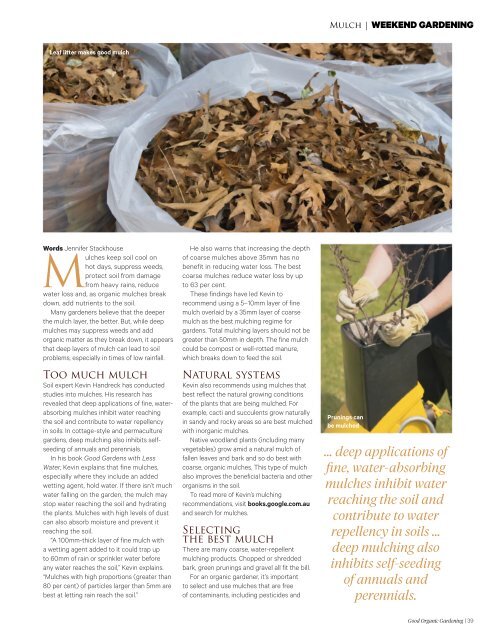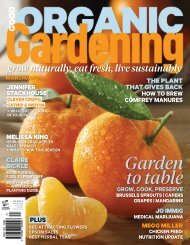3. Good Organic Gardening - May-June 2016 AvxHome.in
3. Good Organic Gardening - May-June 2016 AvxHome.in
3. Good Organic Gardening - May-June 2016 AvxHome.in
Create successful ePaper yourself
Turn your PDF publications into a flip-book with our unique Google optimized e-Paper software.
Mulch | WEEKEND GARDENING<br />
Leaf litter makes good mulch<br />
Words Jennifer Stackhouse<br />
Mulches keep soil cool on<br />
hot days, suppress weeds,<br />
protect soil from damage<br />
from heavy ra<strong>in</strong>s, reduce<br />
water loss and, as organic mulches break<br />
down, add nutrients to the soil.<br />
Many gardeners believe that the deeper<br />
the mulch layer, the better. But, while deep<br />
mulches may suppress weeds and add<br />
organic matter as they break down, it appears<br />
that deep layers of mulch can lead to soil<br />
problems, especially <strong>in</strong> times of low ra<strong>in</strong>fall.<br />
Too much mulch<br />
Soil expert Kev<strong>in</strong> Handreck has conducted<br />
studies <strong>in</strong>to mulches. His research has<br />
revealed that deep applications of f<strong>in</strong>e, waterabsorb<strong>in</strong>g<br />
mulches <strong>in</strong>hibit water reach<strong>in</strong>g<br />
the soil and contribute to water repellency<br />
<strong>in</strong> soils. In cottage-style and permaculture<br />
gardens, deep mulch<strong>in</strong>g also <strong>in</strong>hibits selfseed<strong>in</strong>g<br />
of annuals and perennials.<br />
In his book <strong>Good</strong> Gardens with Less<br />
Water, Kev<strong>in</strong> expla<strong>in</strong>s that f<strong>in</strong>e mulches,<br />
especially where they <strong>in</strong>clude an added<br />
wett<strong>in</strong>g agent, hold water. If there isn’t much<br />
water fall<strong>in</strong>g on the garden, the mulch may<br />
stop water reach<strong>in</strong>g the soil and hydrat<strong>in</strong>g<br />
the plants. Mulches with high levels of dust<br />
can also absorb moisture and prevent it<br />
reach<strong>in</strong>g the soil.<br />
“A 100mm-thick layer of f<strong>in</strong>e mulch with<br />
a wett<strong>in</strong>g agent added to it could trap up<br />
to 60mm of ra<strong>in</strong> or spr<strong>in</strong>kler water before<br />
any water reaches the soil,” Kev<strong>in</strong> expla<strong>in</strong>s.<br />
“Mulches with high proportions (greater than<br />
80 per cent) of particles larger than 5mm are<br />
best at lett<strong>in</strong>g ra<strong>in</strong> reach the soil.”<br />
He also warns that <strong>in</strong>creas<strong>in</strong>g the depth<br />
of coarse mulches above 35mm has no<br />
benefit <strong>in</strong> reduc<strong>in</strong>g water loss. The best<br />
coarse mulches reduce water loss by up<br />
to 63 per cent.<br />
These f<strong>in</strong>d<strong>in</strong>gs have led Kev<strong>in</strong> to<br />
recommend us<strong>in</strong>g a 5–10mm layer of f<strong>in</strong>e<br />
mulch overlaid by a 35mm layer of coarse<br />
mulch as the best mulch<strong>in</strong>g regime for<br />
gardens. Total mulch<strong>in</strong>g layers should not be<br />
greater than 50mm <strong>in</strong> depth. The f<strong>in</strong>e mulch<br />
could be compost or well-rotted manure,<br />
which breaks down to feed the soil.<br />
Natural systems<br />
Kev<strong>in</strong> also recommends us<strong>in</strong>g mulches that<br />
best reflect the natural grow<strong>in</strong>g conditions<br />
of the plants that are be<strong>in</strong>g mulched. For<br />
example, cacti and succulents grow naturally<br />
<strong>in</strong> sandy and rocky areas so are best mulched<br />
with <strong>in</strong>organic mulches.<br />
Native woodland plants (<strong>in</strong>clud<strong>in</strong>g many<br />
vegetables) grow amid a natural mulch of<br />
fallen leaves and bark and so do best with<br />
coarse, organic mulches. This type of mulch<br />
also improves the beneficial bacteria and other<br />
organisms <strong>in</strong> the soil.<br />
To read more of Kev<strong>in</strong>’s mulch<strong>in</strong>g<br />
recommendations, visit books.google.com.au<br />
and search for mulches.<br />
Select<strong>in</strong>g<br />
the best mulch<br />
There are many coarse, water-repellent<br />
mulch<strong>in</strong>g products. Chopped or shredded<br />
bark, green prun<strong>in</strong>gs and gravel all fit the bill.<br />
For an organic gardener, it’s important<br />
to select and use mulches that are free<br />
of contam<strong>in</strong>ants, <strong>in</strong>clud<strong>in</strong>g pesticides and<br />
Prun<strong>in</strong>gs can<br />
be mulched<br />
... deep applications of<br />
f<strong>in</strong>e, water-absorb<strong>in</strong>g<br />
mulches <strong>in</strong>hibit water<br />
reach<strong>in</strong>g the soil and<br />
contribute to water<br />
repellency <strong>in</strong> soils ...<br />
deep mulch<strong>in</strong>g also<br />
<strong>in</strong>hibits self-seed<strong>in</strong>g<br />
of annuals and<br />
perennials.<br />
<strong>Good</strong> <strong>Organic</strong> <strong>Garden<strong>in</strong>g</strong> | 39
















